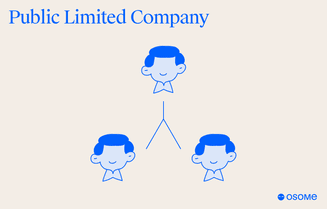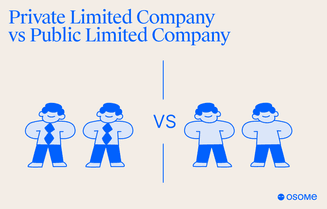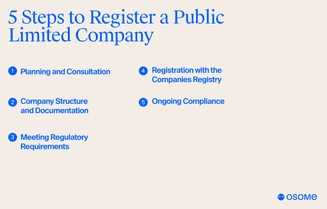The Ultimate Guide to a Public Limited Company in Hong Kong
- Modified: 14 April 2025
- 13 min read
- Starting a Company


Heather Cameron
Author
Heather is here to inform and inspire our readers. Boasting eight years in the world of digital marketing, working in diverse industries like finance and travel, she has experience writing for various audiences. As Osome’s resident copywriter, Heather crafts compelling content, including expert guides, helpful accounting tips, and insights into the latest fintech trends that will help entrepreneurs, founders and small business owners in Hong Kong take their businesses to the next level.

Iris Kwong
Reviewer
Iris Kwong is our Corporate Secretary Manager based in the Hong Kong office. With more than 10 years of experience navigating Hong Kong's Companies Ordinance and regulatory requirements, she is our go-to expert on everything from company formation and annual returns to board meetings and shareholder resolutions. She knows the secrets to ensuring smooth business operations and carefully reviews our Hong Kong-focused content, ensuring it's accurate, up-to-date, and packed with useful tips.
Hong Kong, a global financial hub, offers a dynamic environment for businesses of all sizes. Businesses today may choose to establish a public over a private company limited for expansion opportunities. This guide delves into the key aspects of public companies in Hong Kong, outlining their advantages, regulations, and registration process, empowering you to make informed decisions for your business journey.
Key Takeaways
- A public limited company (PLC) in Hong Kong offers the advantage of raising capital from the public through stock exchange listings or public offerings, which is something a private company cannot do.
- Stricter regulations ensure transparency and investor protection but require adherence to more complex compliance procedures.
- Understanding the differences between public companies limited by shares and other company structures allows you to choose the most suitable option for your business goals.
What Is a Public Limited Company?
A public company limited by shares is a unique business structure in Hong Kong where ownership is divided into tradable shares. Meanwhile, a public company limited by guarantee is a business controlled by guarantors who promise to contribute a predetermined sum to the company as liability coverage if the business fails. This model prevents someone from "buying out" the company by purchasing large shares. Therefore, many non-profits are often limited by guarantee.
Unlike a private limited company, a public limited company has no restriction on the company's share capital division, meaning you can have way more shareholders than allowed for a private company.
PLCs can also offer share capital to the public through an Initial Public Offering (IPO) or a listing on a stock exchange. This allows a business to tap into a vast pool of investors and raise significant capital for expansion, acquisitions, or research and development. Note that this method is not applicable to companies limited by guarantee.
While Osome doesn't offer formation services for public companies limited by shares, we're experts in helping businesses get started in Hong Kong. We can help you with company registration for a private limited liability company. Let us help you lay the groundwork for your entrepreneurial journey!

Let us dive deeper into the features of a public company limited by shares.
Advantages of Being a Public Limited Company
There are many noteworthy public limited company advantages in Hong Kong. Firstly, the ability to raise substantial capital in a short amount of time by offering shares to the public. Different from a private limited company, a public limited company can tap into other finance opportunities, including hedge funds, private trusts, and mutual funds.
Secondly, listing in the stock market can significantly boost a company's reputation and brand recognition. Public ownership fosters greater transparency and accountability, increasing investor confidence in the company's future. Hence, PLCs are also in a better position to negotiate for favourable interest rates.
Finally, public ownership inherently increases transparency and accountability. Investors gain greater insight into the company's financial performance and future plans, fostering trust and confidence in the company's long-term sustainability.
Disadvantages of Being a Public Limited Company
While the advantages are significant, there are also some disadvantages to being a public company limited by shares.
The ability to raise more capital comes with a price tag – stricter regulations. A public limited company operates under a more stringent regulatory framework than private companies. They must adhere to detailed accounting standards, extensive disclosure requirements, and complex corporate governance procedures. These regulations necessitate additional costs for legal and compliance expertise.
PLCs also operate under constant public scrutiny. In many cases, a company's creditworthiness can make or break most companies. Shareholder expectations, media coverage, and potential market fluctuations can pressure management to deliver consistent results. PLCs also need to disclose their annual returns each financial year and produce transparent accounts every six months, adding more burden to the accounting department.

Finally, with a larger shareholder base, founders and existing owners may relinquish some control over the company. Major decisions, such as changing the company name, reassigning a company director, or launching new projects, require shareholder approval before they become valid.
Legal Framework and Regulations
A Hong Kong public company limited by shares is subject to more regulations than private limited companies because shareholders need to be protected. Some of these key requirements include:
- Having at least two directors on the board.
- Holding at least one annual general meeting to update shareholders and allow them to participate in decision-making.
- Producing transparent accounts every six months. This ensures that investors clearly understand the company's financial health.
- Public disclosure of accounting information every financial year, including disclosing the company's annual return to the general public as requested. This transparency fosters trust in the company and the market.

These regulations ensure that Public Companies Limited by shares in Hong Kong operate with high transparency and accountability. This protects investors and fosters trust in the financial markets.
Private Limited Companies Vs Public Limited Companies
There are several differences between a private limited company and a public limited company. A public limited company in Hong Kong has no restrictions on the number of shareholders and can offer shares to the public through a stock exchange listing. This allows them to raise substantial capital from a wider investor base. In contrast, private companies are typically limited to a maximum of 50 shareholders and cannot offer shares to the public.
However, both categories are subject to stricter regulations and compliance requirements than private companies. This is due to the need to protect the interests of public shareholders. Private companies, on the other hand, have simpler compliance procedures.

Finally, Public Companies Limited by shares are generally larger and more complex than private companies. They often have a more sophisticated business structure, with a board of directors and a company secretary. Private companies may have a simpler structure, with fewer directors and potentially no company secretary.
How To Become a Public Limited Company?
To register a public limited company, you must carefully plan and consult with professionals to define your company's structure, dividing your share capital, and determine your share price. Documents required for new company formation include the Articles of Association and Memorandum of Association, the completed application form for company registration, as well as other supportive materials.

Consult with legal and financial professionals specialising in Hong Kong business registration, particularly with registering a public limited company, to gain a more comprehensive understanding of the registration process and ensure accuracy.
How Public Limited Companies Raise Capital?
Public companies limited by shares can gather capital through Initial Public Offerings (IPOs) where PLC shares are offered to the public for the first time. After an IPO, they can issue additional shares to existing shareholders or the public in secondary offerings.
Debt financing, through loans, bonds, or other debt instruments, is another option. Rights issues allow existing shareholders to purchase additional shares at a discounted price. Finally, private placements involve selling shares to a select group of investors, such as institutional investors or wealthy individuals.

Examples of Successful Public Limited Companies
Tencent Holdings is one of the world's largest internet companies and has revolutionised the Chinese tech landscape. Known for its WeChat messaging app, Tencent's success lies in its diverse portfolio of businesses, including gaming, social media, cloud services, and financial technology.
Another notable example is CK Hutchison Holdings, a dominant force in ports, telecommunications, property development, and retail. Its global reach and diversified operations have made it a household name in Hong Kong and beyond.
Choosing the right business structure is crucial for setting your company up for success. Osome offers comprehensive company registration services to guide you through the process. Let us handle the legalities and ensure you select the optimal structure for your business goals. Contact us today to learn more!
Summary
There are two types of PLCs in Hong Kong: limited by shares and limited by guarantee. They are slightly different but face similar advantages and challenges. Generally, a public limited company is stronger in fundraising and credibility building. However, PLCs also face stricter regulations and increased public scrutiny. By understanding the benefits, drawbacks, and legal framework surrounding a public limited company, a business can decide whether this structure aligns with your business goals and aspirations.






